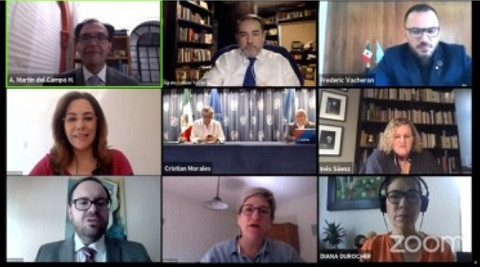
GCED Basic Search Form
Quick Search
Vous êtes ici
Nouvelles

UNESCO, Tec de Monterrey and INAI celebrated the digital seminar "Pandemic, democracy and human rights: new challenges in journalism", in the frame of World Press Freedom Day.
To understand how to turn relevant in people's lives, the media must rethink how they are designing their agendas because, although the problems they face have been exacerbated by the COVID-19 pandemic, this is also a great opportunity to show that journalism is public service good, said Alejandra Xanic, General Editor of the Fifth Element Lab, at the Seminar about press freedom organized by the United Nations Educational, Scientific and Cultural Organization (UNESCO) in Mexico, the National Institute of Transparency, Access to Information and Protection of Personal Data (INAI) and the Technological Institute of Superior Studies of Monterrey (ITESM).
During the virtual dialogue table held this Wednesday, the Pulitzer Prize winner emphasized that, in this context of health crisis, local or regional journalism is crucial to offer people information about what is happening in their communities that allows them to know how to act, how to protect themselves and how to make decisions.
This is an important 'shake to how the issues of society have to be at the center of the media agendas and that the best position in a newspaper should not be the journalist of politics, but the journalist of health and education
-- Alejandra Xanic

The seminar on disinformation, safety of journalists and other challenges that the health emergency imposes on press freedom was chaired by the Resident Coordinator of the United Nations System in Mexico, Antonio Molpeceres; the WHO / PAHO Representative in Mexico, Cristian Morales; the Dean of the School of Humanities and Education at the Tec de Monterrey, Inés Sáenz; and the UNESCO Representative in Mexico, Frédéric Vacheron.
Along with Xanic, Guilherme Canela, Head of the Section of Freedom of Expression and Security of Journalists of UNESCO, the INAI Commissioner, Blanca Lilia Ibarra, and Aurelio Collado, professor at the School of Humanities and Education at ITESM, participated in the discussion panel of the digital seminar "Pandemic, democracy and human rights: new challenges in journalism". Alejandro Martín del Campo, also from ITESM, served as moderator in a session in which journalists, academics and students participated.
Guilherme Canela agreed that the media, especially local and community, are also at risk of closing or being captured by private interests due to the lack of resources for their subsistence, thus affecting a free and plural media environment, reason why he made a call to recognize the role of journalism in societies and support it.
Canela explained that, although UNESCO has detected attempts to control information or to suppress access to information through various mechanisms, he stressed that the responsibility for tackling mass disinformation also rests with journalists, verifying facts, documenting cases and contrasting information.
For Aurelio Collado, professor at the School of Humanities and Education of the ITESM, the challenge of the media is not only found in the battle for credibility, but also in the formation of more critical audiences so that people can have the tools to select the pertinent information among all that is produced and shared in the so-called “infosphere”.
Having clear, timely, truthful information and from reliable sources is vital so that people [...] can know what to do, can know how to behave, can know how to protect themselves [...]. The media can, then, contribute to a change in behaviors that help reduce the spread of the disease and not overburden health services
-- Cristian Morales
Meanwhile, INAI Commissioner Blanca Lilia Ibarra pointed out that it is essential that governments guarantee adequate channels, so that the media can carry out their work without facing grievances, with professional ethics, in an inclusive and responsible manner, since “the journalistic exercise allows to save lives. "
This was the first of a series of open and free seminars that UNESCO, Tec de Monterrey and INAI, will organize in May in order to underpin brave and favoritism-free journalism, as well as the safety of journalists and the sustainability of the media.
In the coming months we will face unsuspected challenges of health, education, employment, inclusion, social cohesion and preservation of natural resources. It is vital, above all, to protect the most vulnerable groups such as women, the elderly, indigenous communities […] Without ethical and courageous journalism, this protection work will be harder, slower, and more costly for society
-- Frédéric Vacheron
Links of interest:
- High-level online dialogue: Press freedom and the fight against disinformation in the context of COVID-19
- Journalism, press freedom and COVID-19
URL:
https://en.unesco.org/news/pandemic-democracy-and-human-rights-new-challenges-journalism
